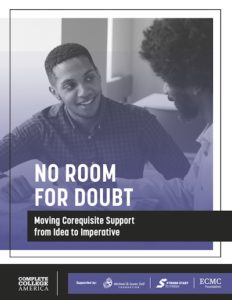There is no doubt that traditional prerequisite remedial education is an academic dead end. A decade ago, over 1.7 million students were being enrolled in non-credit-bearing courses each year. The offerings were full of unintended and counter-productive deficits thinking about what students ‘couldn’t do’ and how they ‘weren’t ready,’ for college-level work, with fewer than 1 in 10 going on to graduate.
The problem was undeniable. Fortunately, a decade of reforms led to positive changes in how college students pick a program of study, are placed into first-year courses, and supported along the way. Yet in a recent and major survey of higher education leaders, over half report that they still rely on traditional remedial sequences from which students stop out from college, without credit and with plenty of debt. The negative effects are particularly pronounced for Pell-eligible and Black, Latinx, and Indigenous students. One recent study by the State Higher Education Executive Officers found inexcusable institutional performance gaps: “gateway” course failure rates were twice as large among Black students as compared to their White peers.
These and other important findings are summarized in No Room for Doubt: Moving Corequisite Support from Idea to Imperative, an impassioned call-to-action published in April by Complete College America (CCA). The report summarizes evidence that the corequisite model—with students enrolled in credit-bearing, well-designed, and well-supported first-year courses—leads to greater persistence and completion. It also makes a compelling case for colleges, universities, systems, and state agencies to take a holistic approach by:
- Making the corequisite model the rule, not the exception
- Changing policies in ways that create awareness, understanding, and momentum in support of reform
- Setting clear goals so that progress can be measured and celebrated
- Resourcing efforts, with adequate funding and aligned incentives, mindful that greater student persistence and completion is likely to generate a net positive financial return-on-investment
- Creating the right conditions for change through consistent and affirming communications, use of data, and inter-personal engagement
- Integrating corequisite reforms with other efforts, to foster coherence, and
- Designing effective learning experiences with “pedagogical best practices tailored to the needs of corequisite students.”
CCA’s call-out of effective and equity-promoting pedagogy is notable. In the short history of developmental education reform, many efforts are focused outside of class.
For example, three of the four ‘pillars’ of the ‘guided pathways’ model focus on i. defining a clear path of study (design), ii. helping students select the path that’s right for them (onboarding), and iii. helping students stay on the path, often through advising and other out-of-class resources (support). The fourth pillar, to ‘ensure learning,’ has been under-addressed. By emphasizing the importance of, what CCA calls, “just in time” instruction that is “student-centered and culturally-responsive,” the report honors the unique impact that faculty have on student success and equity.
This past year, ACUE experienced as much with developmental English faculty in Arkansas in Ohio. Through generous support from Strong Start to Finish (SSTF), a national network dedicated to the reform of developmental education, ACUE is credentialing faculty in Effective Teaching Practices for in-person, online, and blended corequisite instruction. Well over 90% found recommended practices relevant to their corequisite courses and helpful in refining their instruction. Participating faculty learned about and implemented dozens of evidence-based and equity-promoting practices shown to close institutional achievement gaps among students of different race and socio-economic status. As faculty developed proven instructional practices, they also gained more positive mindsets about their students’ ability to learn and their own ability to impact this change.
The holistic approach recommended by CCA will be complemented in a forthcoming toolkit by ACUE and SSTF, “Success and Equity through Quality Instruction: Engaging Faculty in the Student Success Movement.” Designed as a resource for self-assessment, planning, and action, the toolkit shows how faculty bring all seven of the core principles of developmental education reform to life and how institutions should support their efforts.
Dr. Jonathan Gyurko is President and Co-Founder of ACUE.

